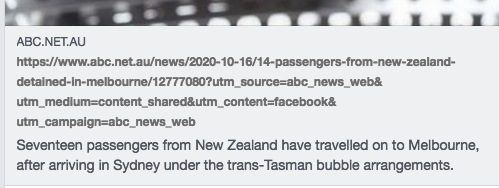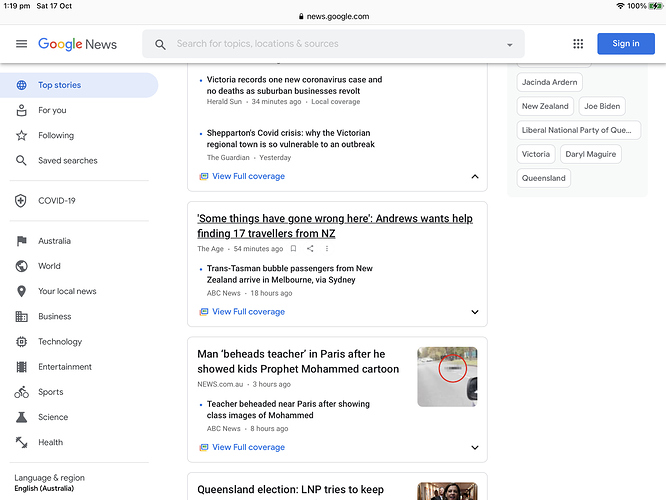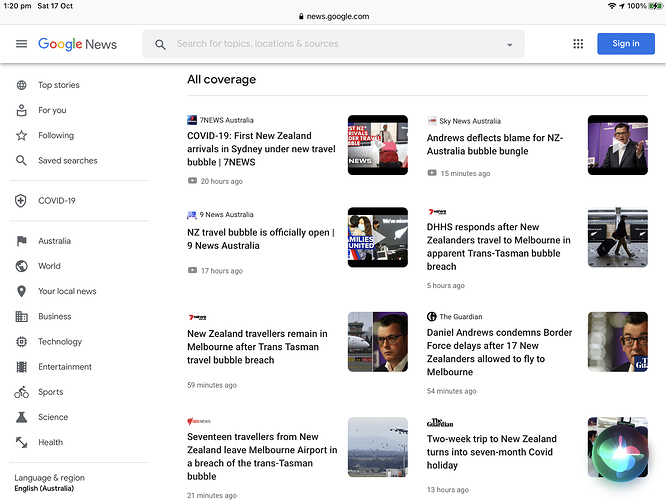Perhaps this would leave Google and FaceBook to rely on SBS and the ABC for news feeds. Or would they?
What is more likely is that Facebook and Google would create their own news rooms to provide their platforms with content. Ultimately distrust in both remains high, so long term I’d expect to see publishers like the ABC push the idea that their app is how to get news now. Already in WA ‘The West Australian’ newspaper has been on an advertising blitz based around the fact they’ve got the Coronavirus news without the misinformation.
An article regarding Google agreeing to pay for some high quality news content.
No mention of paying for rubbish from News Corp.
I think this is important because scammers are everywhere and they prey on the ones who do not know how to determine the works of these groups or individuals.
The ACCC has announced the draft for the mandatory Code Of Conduct for media and news companies.
Sometimes a news item crosses several topics. Hopefully this reflects the core of the discussion here. It also relates to how device OEM T&Cs are interpreted by the OEM, and digital privacy.
Facebook Is the key beneficiary or loser in this instance, while Apple is simply protecting it’s space in a global market.
Despite the ruling has anything really changed?
Loose your Face-book history it will be safe somewhere in the USA! Or is that many somewhere’s?
Facebook finally takes action against Holocaust deniers.
Now Twitter is cracking down on fake accounts.
YouTube says #MeToo.
Fixed that for them.
I’ve been thinking on this thing again and I just (much against my better judgement) went to look at News.google.com, and facebook.com and to be absolutely honest, I cannot see an issue with them. ON facebook, there is no specific news service… its just users like thee and me and the only thing that turns up most times is the headline and nothing of the content. UNless we users quote parts of it as part of the post, and thats not facebook’s “fault”. Google provides an aggregator, pretty much like any other RSS feed reader. Feedly used to draw its feeds from there, dont know what it does now, because I use Reeder and add my own. Nonetheless, in just having a quick look at google, there didnt seem to be an ad in sight and no, I’m not running an ad blocker in safari at the moment.
As for the rest of Facebook and google… hrrrmmmm. Well, I no longer have any google products and facebook is on the way out for me too.
The key difference is news organisations have direct control over if they provide an RSS feed, and if they do how much of the article appears in it. Where as Google and Facebook make substantial ad revenue specifically off collecting these articles and snippets without them being offered
Can you point to actual examples please? I’m just not seeing what you are saying. I’m seeing no instances of collection at all. And what ads?
For example, with google, every link at this list https://news.google.com/topstories?hl=en-AU&gl=AU&ceid=AU:en leads directly to the news media running the story. Seriously, theres NOTHING wrong with this. I’ve just compared it with my still existing feedly account and theres really no difference. Except feedly has my info via the account, and google doesnt, because I can check the feed without a login.
Any time one clicks on a google hit, and depending on whether that is the actual URL or the google hit presented as a search result, if you watch on the bottom of a browser that displays it, you will see ‘handshaking’ including from such 3rd sites as doubleclick and others. There are myriad intermediaries that can partake.
Doubleclick is a prime example of how google builds your profile to serve ads, and eventually receives revenue for driving business from clicks. Whether that is good, bad, indifferent, right, or wrong is another discussion.
Maybe safari blocks them by default. On my iPad I see no such thing. I do have stuff like popups etc blocked in my settings, as any sane person would. I’ll have a squiz on the computer (a Mac) too. I admit to not doing much there of late.
An article from “The Verge” explains Safari’s ad blocking process:
Oh good. But right now I am looking at news.google in firefox, and I am still not seeing the ad mob links. It was google, then gstatic, then the actual news source (the guardian in the case of the link I followed). No other intervening links. I did find it interesting that theres the usual LONG obfuscating tract of indecipherable text… places like The Guardian and ABC have really short ones, but the ones for Murdoch news are so long they have to be ellipsed in the middle. I’d like to know whats there, I would.
Since I’m here on Firefox on my Macbook, I thought I would have a look at the link which I posted earlier. Facebook adds information which enables it to track any clicks. It does this with everything. But facebook cookies are to be found on almost every website on the planet… even ABC uses them.
Here’s that link…

Those handshakes are not blocked or blockable per se since they happen ‘behind the curtains’. That which gets blocked are cookies and ads, not the routine of serving web pages; although an increasing number of web pages do not display properly when ad blocking is turned on because it stops the ‘double click (and friends) chains’. Most ad blockers now have a basic ‘more relaxed’ setting to avoid breaking page displays while still blocking ads, more or less successfully. The differing browsers also handle it more or less successfully than others.
Doubleclick is not the only culprit, just an original and thus was a good example.
edit:
Want to have a punt what gstatic is?
# Host Search Results: gstatic.com
## About this host:
This domain is owned by Google.
The main purpose of cookies set by this host is: Targeting/Advertising
It’s not visible at all unless you go into your cookie history and look. Having said that Apple is trying to clamp down on these behaviours.
To answer this question, here’s a look at what you get searching news on Google. 
Evidence suggests this is enough information for as much as 50% of readers. Google and Facebook get the views in the same way someone might skim a newspaper only reading snippets. The difference being the publication that wrote the article gets nothing whilst Google and Facebook get billions in ad revenue
There is pretty much 0 way for a publication to opt out of the above example. It’s auto generated by Google.
I’m a cynic. I would suggest that those who don’t read more than the headline and the snippet are those who don’t go looking for news anyway. For example… I don’t use google news at all, I go to the sources that I like (Michael West, The New Daily, Independent Australia and so on). I have links direct to them in my browser, and I have them in my RSS reader. Theres enough information in the snippet to tell me whether I want to read more. Sometimes I dont, and sometimes I do. The very same thing applies when going direct to the news site. I don’t hit every available story, theres just not enough time in any given day

